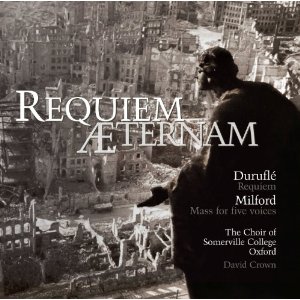 |
 |
|


alternatively
CD:
MDT
AmazonUK
AmazonUS
|
Maurice DURUFLÉ (1902-1986)
Requiem, Op.9 (version for choir, organ and cello) [40.49]*
Robin MILFORD (1903-1959)
Mass for five voices, Op.84 [18.20]
 Christine Rice (mezzo)*, Mark Stone (baritone)*
Christine Rice (mezzo)*, Mark Stone (baritone)*
Guy Johnston (cello)*, Tristan Mitchard (organ)
Choir of Somerville College Oxford/David Crown
rec. Abbey Church, Douai Abbey, Berkshire, 13-15 July 2011* and
Somerville College Chapel, Oxford, 11-12 July 2011
 STONE RECORDS 5060192780208 [59.12]
STONE RECORDS 5060192780208 [59.12]
|
|
|
I first encountered the music of Robin Milford when his niece
Marion, who was singing in a performance of my The Children
of Húrin at Oxford, introduced me to some songs by
her uncle. These were included on a Hyperion LP (A66105) devoted
to the music of “Gerald Finzi and friends” (reissued
CDH55084). This was the first time that any of Milford’s music
had appeared on a commercial recording. Since then a number
of CDs (review review) have appeared featuring various of his works, but these
have all been miniatures. The mass included here is the largest-scale
of his compositions to have been released, although there remain
some other more substantial works which await recording. It
was originally entitled Mass for Christmas morning, but
after her uncle’s death Marion Milford suggested the new
title Mass for five voices since the work has no obvious
Christmas connection. This is perhaps unfortunate, as the original
title might have helped the work to gain a slightly higher profile.
It does not appear to have received many performances (if any)
since its first outing in 1953. In the event the work proves
to be remarkably unsettling for Christmas festivities.
At the beginning of the Kyrie one immediately detects
the influence of Vaughan Williams’ Mass in G minor;
but almost at once one also finds a restlessness and experimental
use of modality that at times recalls Delius, at other times
the Holst of the Hymn of Jesus, and at other times seems
to anticipate the liturgical passages in Britten’s War
Requiem. This is highly unsettled - and unsettling music
- troubled in spirit. The music often lurches unpredictably
into new tonal centres, sometimes rising to thrilling effect
and at other times falling chromatically into an almost depressive
state. It never abandons its tonal ethos, but it sounds very
difficult indeed to pitch and to sing. The booklet informs us
that Milford prepared an organ accompaniment to reinforce the
singers, but this is not used except in the Credo where
it has an independent part. At other points - particularly in
the Benedictus - which in this setting is shorn of its
final Hosanna - one gets the uncomfortable feeling that
the singers might have welcomed organ support to avoid the queasy
impression that they sometimes give of an uncomfortably awareness
that their pitch may be threatening to sag downwards. The choir
of Somerville College is not like many other Oxbridge choirs,
with boy sopranos and male altos; it consists of a body of students
who strive valiantly with some very tricky writing. Milford
is very much his own man in this music, not just a pale imitation
of his teachers Vaughan Williams and Holst. It makes one very
interested to hear some of his other large-scale choral works
such as the oratorio A prophet in the land, from which
Marion Milford recorded an excerpt for a Hyperion LP (A66048
never transferred to CD).
The matter of finding a coupling for Milford’s Mass
must have constituted a problem, and the choir here opts for
another liturgical piece written at the same time, Duruflé’s
Requiem. This is given in the chamber edition for soloists,
choir, organ and cello, which Duruflé himself regarded
as a valid alternative to the full orchestral version. However
it must be observed that although this has received a goodly
number of recordings over the years, it lacks the full flavour
of the work with orchestra. Duruflé himself when recording
the Requiem opted for the fuller orchestration and this
is currently available on a cheap Warner Apex CD. It must be admitted that the chamber version is very
much ‘penny-plain’ when compared to the ‘twopenny-coloured’
orchestration. It is not helped here by a rather distant recording
- in a very different acoustic to the Milford - where the organ
is sometimes hard to distinguish clearly. Its sudden eruption
at the beginning of the Libera me comes as rather a shock,
as does the abrupt use of full voice by Christine Rice in the
Pie Jesu.
Obviously this disc is most valuable for the Milford, which
should be investigated by all lovers of English liturgical music
- but by others too. The Duruflé is given a nicely recessed
performance which brings out all its charm and devotion.
Paul Corfield Godfrey
|
|




 All Nimbus reviews
All Nimbus reviews








